Financial Stability Board calls out Swiss Government handling of Credit Suisse, stating they ignored accepted resolution frameworks. I argue they did it for the 50 years of secrecy.
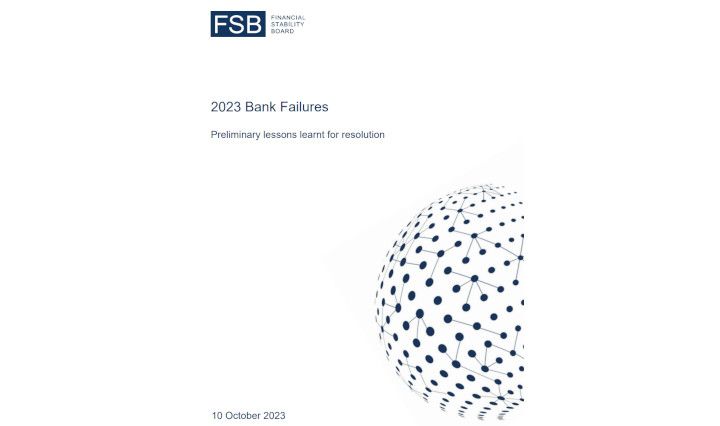
G-SIB resolution and the Credit Suisse case:
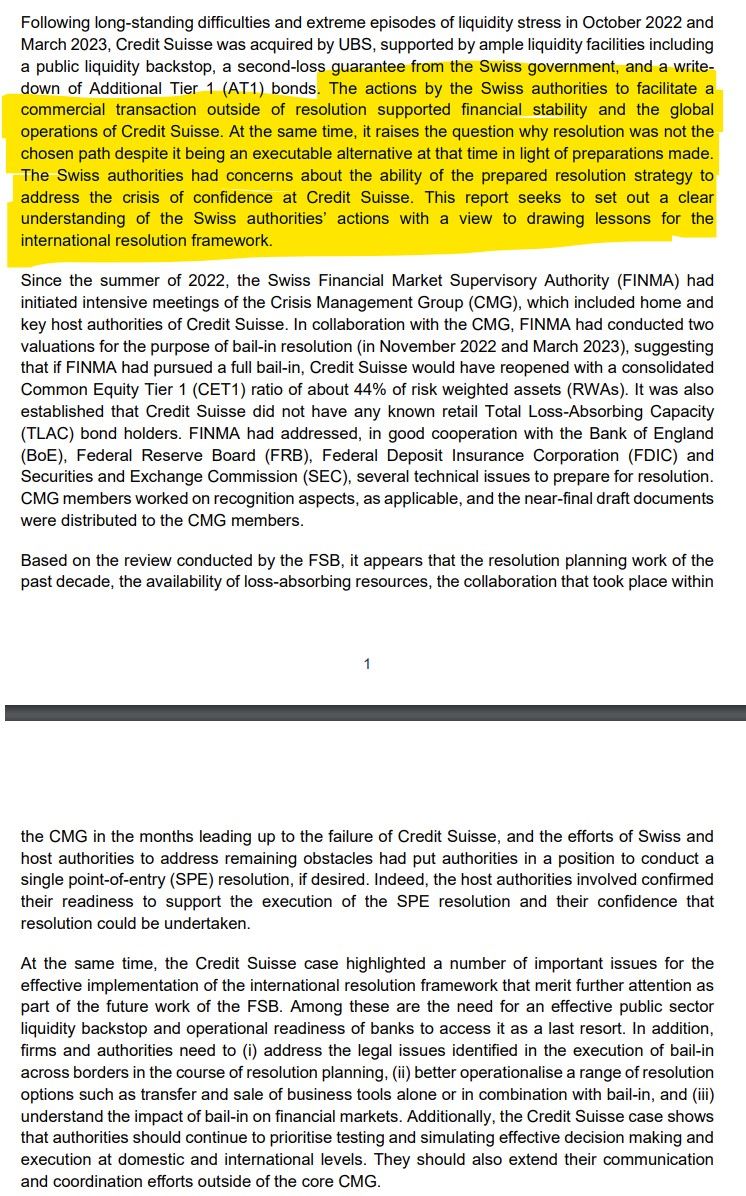

Preliminary lessons learnt from the Credit Suisse case for G-SIB resolution and resolution planning:
Credit Suisse was acquired by UBS, supported by ample liquidity facilities including a public liquidity backstop, a second-loss guarantee from the Swiss government, a dilution of its shareholders, and a write-down of Additional Tier 1 (AT1) bonds. The actions by the Swiss authorities to facilitate a commercial transaction outside of resolution supported financial stability and the global operations of Credit Suisse. In this report, such actions are considered in the context of the available alternatives, with a view to drawing lessons for the international resolution framework. This review did not identify any material remaining obstacles to resolution, which suggests a close consideration of how outcomes might have differed if Credit Suisse had undergone the Single Point of Entry (SPE) resolution prepared by home and host authority members of the Crisis Management Group (CMG). This section therefore discusses the Credit Suisse case and looks at the benefits that resolution preparedness yielded for the specific case, followed by a discussion of challenges observed and preliminary lessons for the international resolution framework.
Background on the Credit Suisse case:
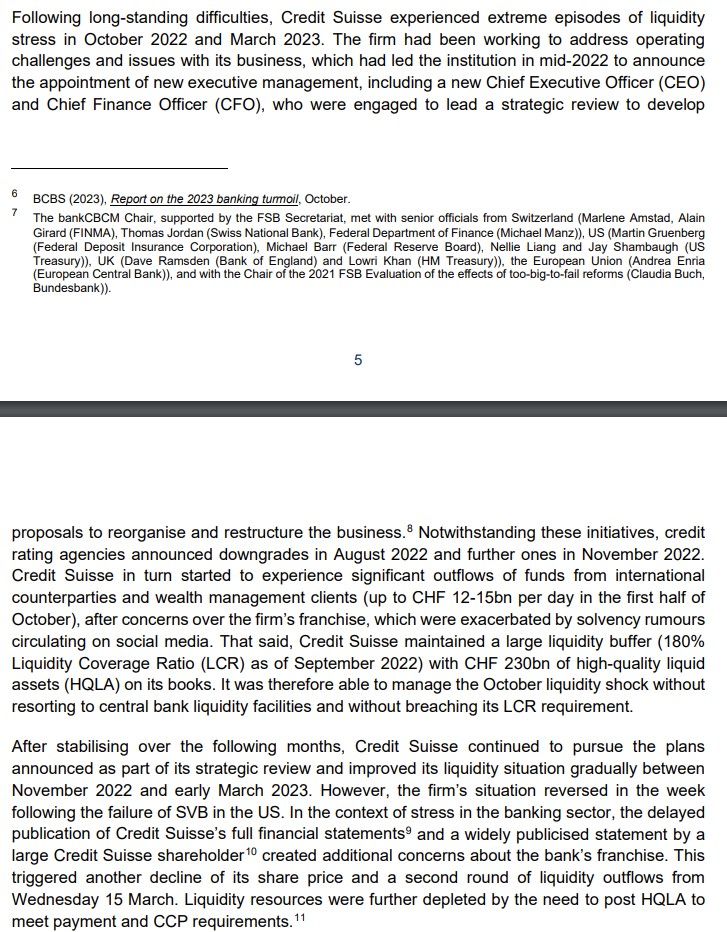
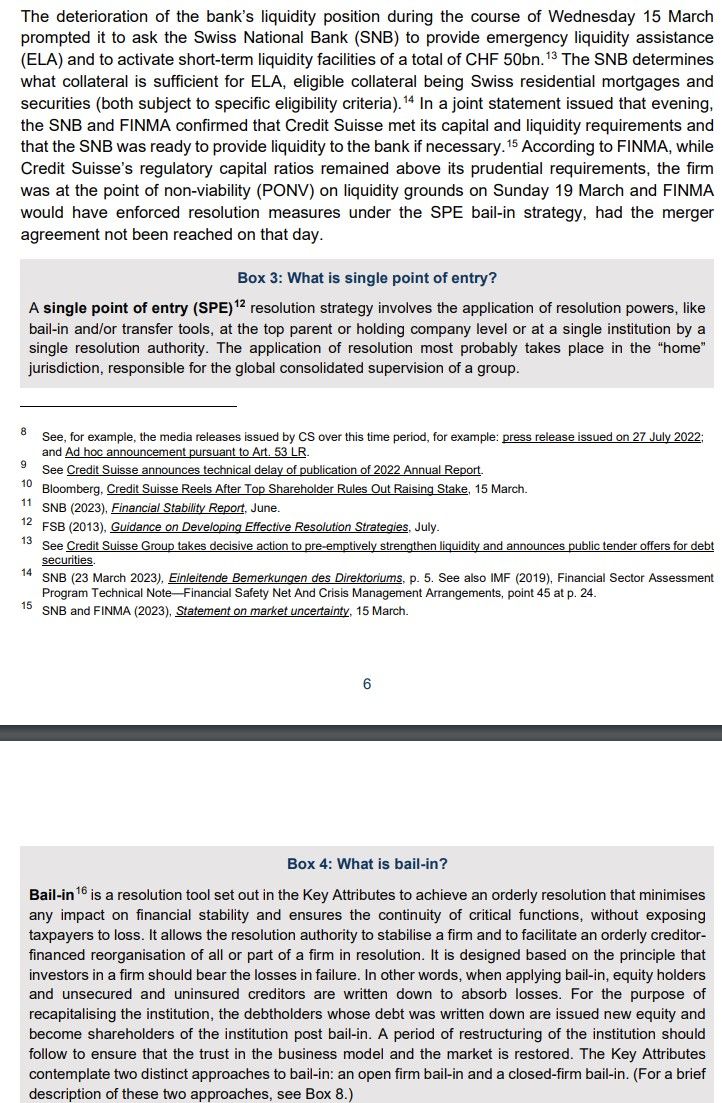
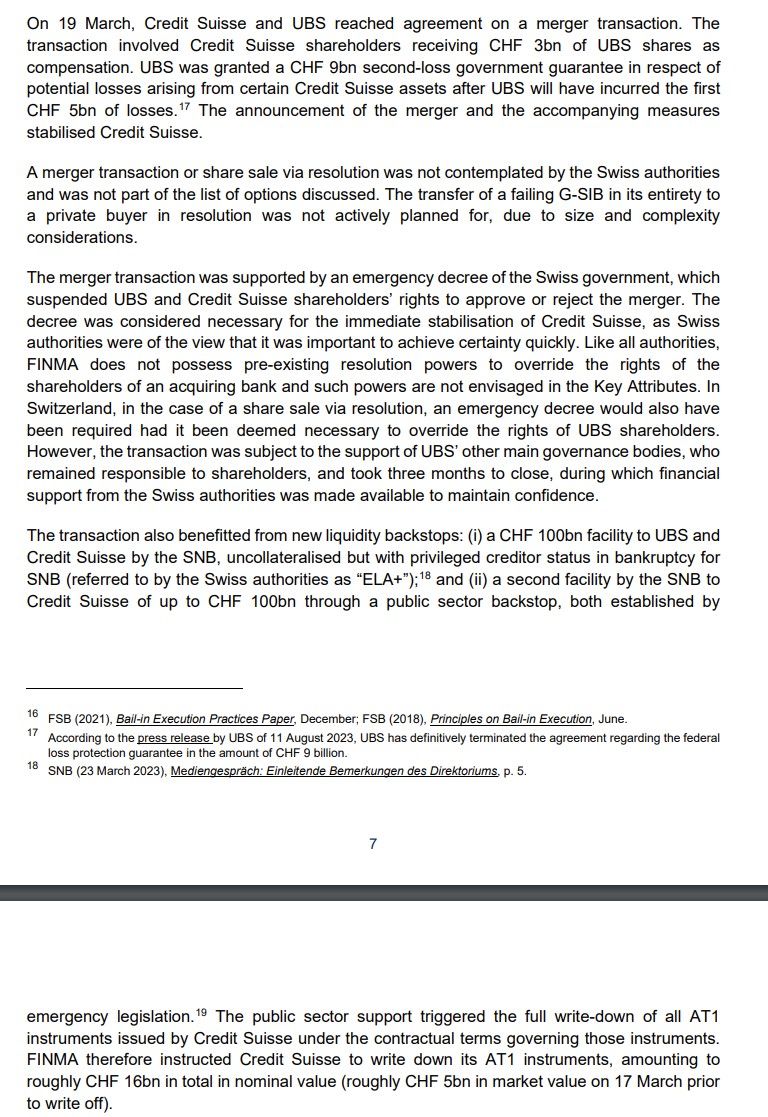
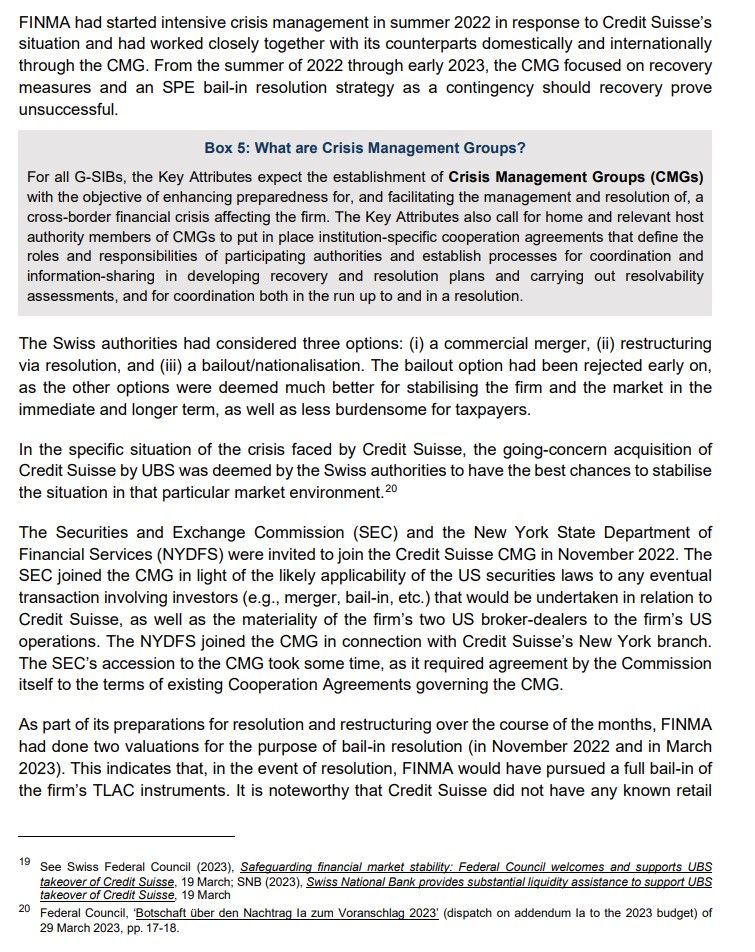
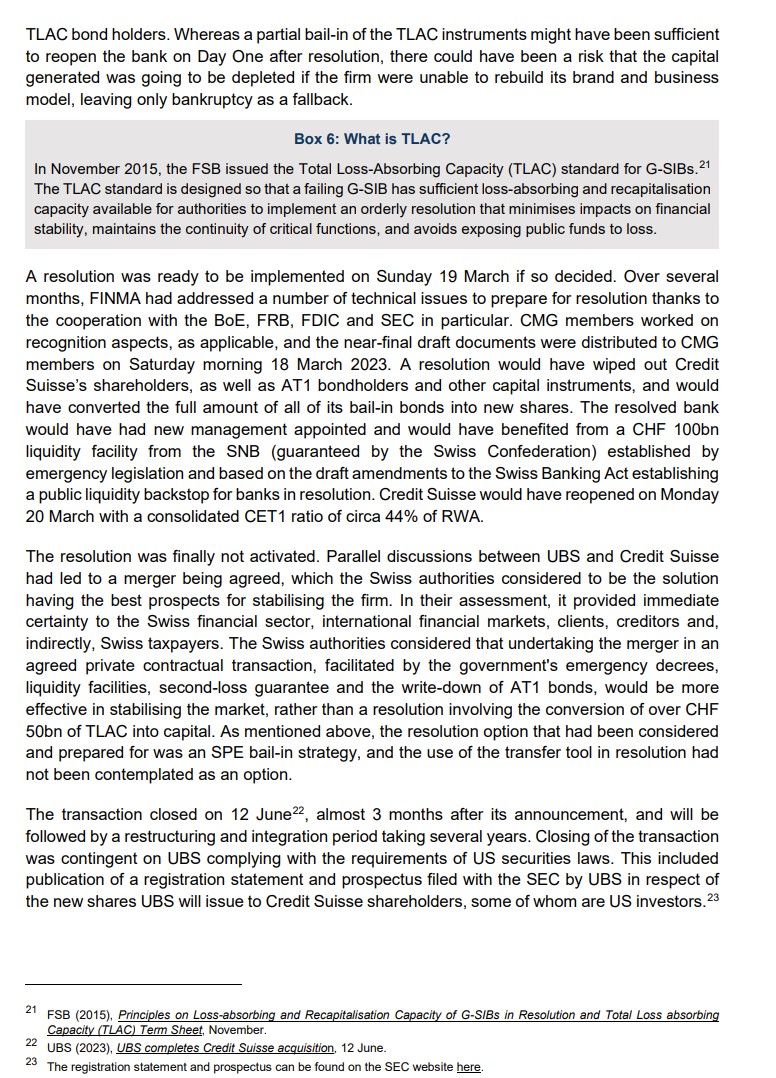

Implications of the Credit Suisse episode for the FSB Resolution Framework:
The handling of Credit Suisse had several important positive aspects. The first is that it supported financial stability, as financial markets were not disrupted, and customers continued to do business with the bank. Second, the Swiss authorities chose a path that supported global operations and non-Swiss entities. This has been an important goal of the resolution framework and international coordination over the past decade or so. Thirdly, shareholders and AT1 creditors experienced significant losses, although not with the same result as in a resolution scenario.
The FSB’s international resolution framework developed and endorsed by key jurisdictions, was designed to handle the failure of G-SIBs, among other financial institutions. Resolution regimes provide powers and options to authorities to resolve a firm that is no longer viable and has no reasonable prospect of becoming so. In this context, the Credit Suisse case raises the question why resolution was not the chosen path and what lessons can be drawn for the international resolution framework.
The international resolution framework envisages shareholders losing their investments and debtholders being bailed in in case of a systemic bank failure. It seeks to achieve such outcomes in a manner that does not expose taxpayers to loss and that allocates losses to shareholders and creditors while respecting the hierarchy of claims in liquidation. Since the Global Financial Crisis, key authorities, including central banks, prudential supervisors, and resolution authorities, have planned and collaborated extensively around this framework. Though execution risks and uncertainties about market impact remained, a successful resolution of Credit Suisse could have provided clear confirmation to market participants that the Key Attributes objectives could be achieved.
In the Credit Suisse case, the second-loss guarantee provided by the Swiss government remained a potential cost to taxpayers until the termination of the guarantee in early August. Since the actions were taken outside resolution, the absorption of losses by shareholders and bondholders did not follow the hierarchy of claims that is established for liquidation or resolution.
Several factors have been suggested as to why resolution was not chosen. These include possible knock-on effects from imposing losses on shareholders and bailing in bondholders; uncertainty about the market and customer acceptance of a stand-alone recapitalised entity; and certain execution risks, including the mechanics of bail-in. These factors are further analysed in section 1.4. On the other hand, FINMA has indicated it was ready to implement the prepared resolution if merger negotiations would not have led to an agreement in time. FINMA expressed the view that resolution measures should always be considered measures of last resort, i.e., subsidiary to other measures that are deemed to provide the same stabilising effect.
Some have suggested that this episode demonstrates that the resolution framework is not workable. However, the FSB’s review does not support that conclusion. As indicated above, a resolution was ready to be implemented that weekend. While the choice of resolution would have presented some uncertainties, as would any solution to a banking crisis, the Swiss authorities considered that an alternative option was preferable in this particular case.
The FSB will identify and propose possible enhancements to the implementation of the international resolution framework in jurisdictions that would reduce uncertainty related to choosing resolution.
The report goes onto tout the existing framework as perfectly capable of handling the Credit Suisse situation:
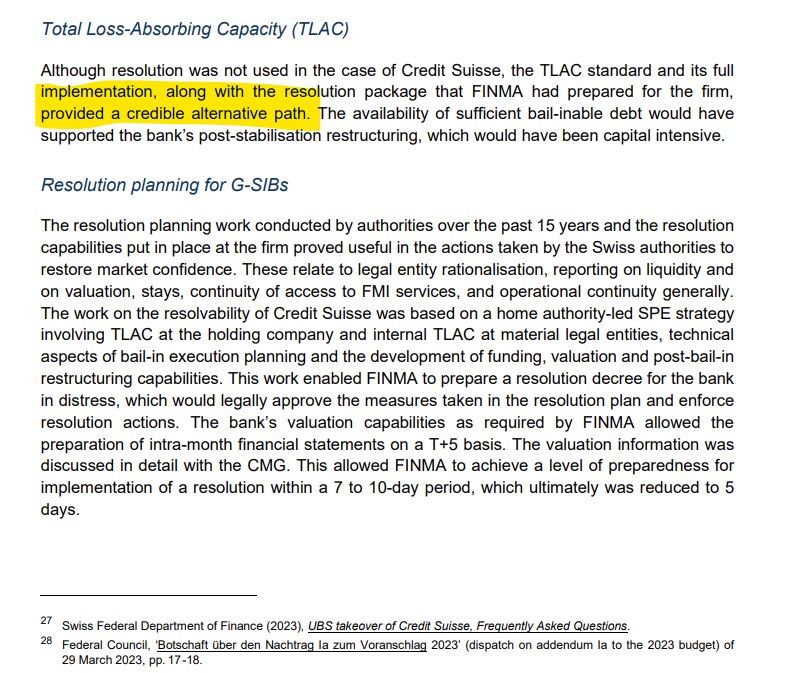
Why would the Swiss National Bank do this?

A parliamentary investigation into the collapse of Credit Suisse will keep its files closed for 50 years, according to a parliamentary committee document, a level of secrecy that has triggered concern among Swiss historians.
The document means the investigating commission would hand over its files to the Swiss Federal Archives after a longer gap than the usual 30 years to ensure high levels of confidentiality apply to the investigation, which has generated huge public interest.
Ahh, they went this route to be able to burry Credit Suisse details behind secrecy for 50 years?...

TLDRS:
- Financial Stability Board calls out how Credit Suisse was bailed out.
- States the accepted international model was a viable alternative:
- "the Credit Suisse case raises the question why resolution was not the chosen path and what lessons can be drawn for the international resolution framework."
- I argue opaqueness and wanting to hide what is in Credit Suisse behind secrecy for 50 years (GameStop shorts?) as a reason to not utilize the more transparent framework.



